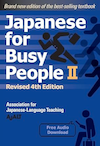- Eligibility
-
- Those who have had at least 50 previous class hours of Japanese language study.
- Besides simple everyday conversation, should be able to make basic responses even if they cannot fully and correctly express themselves yet.
- Able to read Hiragana and Katakana
- Focus and Achievement Goals
-
- The main focus is on conversation, but writing and reading skills are required.
- Using various verb forms.
- Using both polite and casual language and expressions in daily conversation.
- Using expressions of comparison (... yori ... no hou ga ...), experience(...ta koto ga arimasu), advice(...ta hou ga iidesu. ...nai hou ga iidesu.), reported speech(... to itte imashita.), thought(... to omoimasu), etc.
- Textbook
- "Japanese for Busy People Vol.2" (by Kodansha International)

High-beginner
- Program of study
- Number of lessons require
90 minutes lessons x 48-52 lessons (varies depending on the learner's situation, frequency of lessons, and length of each lesson)
| Chapter | Lesson | Grammar Points |
|---|---|---|
| 1 | 1, 2 | ●~で~がいちばん~です。 ●~たいんですが、~。 ●~は~がいいです。 |
| 2 | 3, 4 | ●~のほうが~より~です。 (Comparisons) ●~は~が[adjective] ●~にします。 (choosing and decision) |
| 3 | 5, 6 | ●~は~より~です。~はいちばん~です。 ●どこか、なにか、だれか ●~にいきます。 (purpose の「に」“go to do ...”) ●~ましょうか。 (Shall we ...?) |
| 4 | 7, 8 | ●Plain forms of verbs: た-form, なかった-form ●Plain forms of adjectives and "noun+です" ●~とおもいます。 (I think ...) ●~でしょうか。 (Soliciting suggestions) |
| 5 | 9, 10 | ●~といっていました。 (... said ...) ●~てみます。 (try) ●~てきます。 (go, do something and return) |
| 6 | 11, 12 | ●たかい/たかくて、 きれいな/きれいで (Adj. → Connective) ●~ています。 (Completion and result) |
| 7 | 13, 14 | ●~たことがあります。 (Experience) ●[verb]+んです。 ●~も (emphasizes large amount) |
| 8 | 15, 16 | ●~たり、~たりします。 ●~ながら ●~ましょうか。 (Shall I ...?) |
| 9 | 17, 18 | ●Potential form ●~ので (Giving a reason) |
| 10 | 19, 20 | ●[noun]のとき/[adjective]とき ●~てから (after ... ing) |
| 11 | 21, 22 | ●~く/になります。 ●[verb]+とき |
| 12 | 23, 24 | ●わたしが すんでいる ところ(Modifying the noun) ●みえる/きこえる (Visible/audible) ●~に~かい (... per...) |
| 13 | 25, 26 | ●~たほうがいいです。/~ないほうがいいです。 (should /should not) ●はやい/はやく、 しずかな/しずかに (Adj. → Adv.) |
| 14 | 27, 28 | ●~なければなりません。 (have to) ●~なくてもいいです。(don't have to) ●まだ~ていません。 (not yet) |
| 15 | 29, 30 | ●りゆうの「て」「で」 Giving a reason ●~て/で + [きもちのことば] (Emotional expressions) |
| 16 | 31, 32 | ●Volitional form ●[Volitional form]+とおもいます/おもっています。 ●までの/からの/への/との/での |
| 17 | 33, 34 | ●[verb]+の (Nominalizing sentences) ●~のばあい (In case) ●~こともあります (It sometimes happens that ...) |
| 18 | 35, 36 | ●~さ (Used to nominalize adjectives) ●~たら (when) ●~あいだに (while) ●~よてい (plan to) ●自動詞と他動詞 じどうしと たどうし (Intransitive Verb, Transitive verb) |
| 19 | 37, 38 | ●~かもしれません。 (maybe) ●~たら (if) |
| 20 | 39, 40 | ●~たら~ました。 (unexpected, surprise, result) ●~てしまいました。 (regret or completion) |
| 21 | 41, 42 | ●Conditional form ~ば ●~しか~ない (showing there is little of something) |
| 22 | 43, 44 | ●~そうです。 (seems; looks) ●~なら (If it's the case ..., then?) |
| 23 | 45, 46 | ●~と (Speaking of natural or habitual result) ●~でしょう(か)。 (Expressing suppositions) |
| 24 | 47, 48 | ●~し、~し (Giving more than one reason) ●~てきました。 (Expressing continuation from the past to present) ●~ていきます。 (Expressing continuation from present to future) ●~がほしいです。 (... want[object]) |